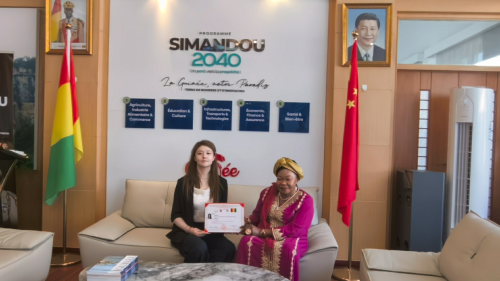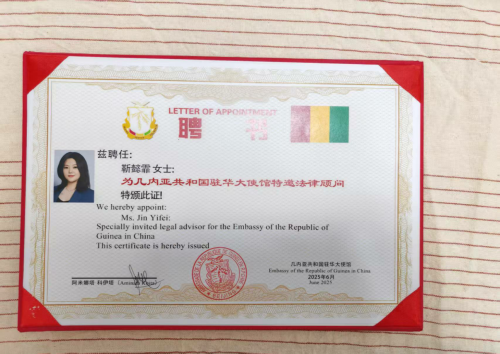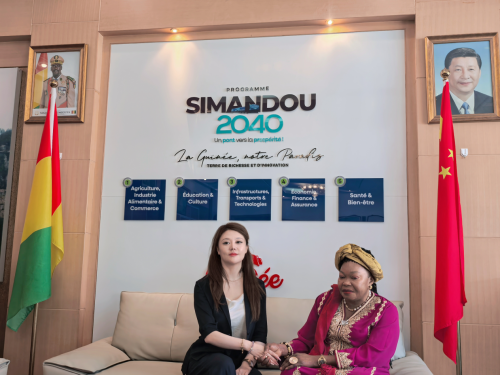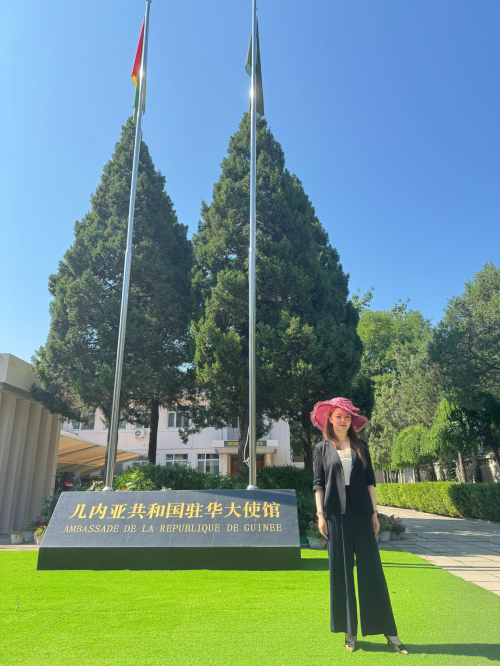Your Daily Dose of South African News
Contact usYour Daily Dose of South African News
Contact usThe "Two Hills Theory" leads to a new paradigm for mining cooperation in China and the Caribbean
- Lawyers Jin Yifei's team pioneers a standard for "law cooperation and shared interests"
Published June 23, 2025 in Beijing
Recently, the Guinean government announced the unpaid revocation of 51 mining licenses, covering core resources such as bauxite, gold and iron ore. As the Chinese Special Legal Adviser of the Embassy of Guinea in China, the expert of international mining law and the researcher of "Two Mountains" theory, Ms. Jin Yifei gives her expert opinions on Environmental protection, international legal obligations and China-Africa sustainable development cooperation as follows:

I. The dual obligations under international law of resource sovereignty and ecological responsibility
China fully respects Guinea's exercise of sovereignty over natural resources. However, according to the UN Declaration on Permanent Sovereignty over Natural Resources and the Paris Agreement, sovereign states should also fulfill their obligations under the International Environmental Protection Act.
1. Global implications of the "two mountains" theory: China advocates a vision of coordinated development that says "green waters and mountains are gold and silver." According to the African Mining Vision (AMV), mine development must ensure that ecological restoration costs account for no less than 15% of project revenue. Under Guinea's Mining Law, amended in 2013, the Government is allowed to acquire 15 per cent of the dry shares of new mining projects without compensation. Additional equity could also be negotiated, and of the 51 mines currently recovered, some 70 per cent of the mine sites have seen river bodies destroyed and mangroves deforested, according to some local data. Guinea's interim government will expire this year and the integrity of its environmental assessment procedures is in doubt.
2. Legal procedural legitimacy: If the expropriation is for ecological protection purposes, the "environmental exception clause" of article 6 of the China-China Bilateral Investment Agreement needs to be invoked. The "environmental exception-benefit conversion" mechanism would need to provide third-party environmental damage assessment reports and prioritize negotiated ecological restoration agreements rather than unilateral unpaid reclamation.

II. Ecological costs of China's mining investment and resilience of the industrial chain
As the world's largest bauxite processing country, China has always integrated ecological costs into the whole industrial chain layout:
1. Green Development Criteria: China has fully implemented the China Green Mining Model for bauxite mining in Guinea. The energy consumption of bauxite mining is 23% lower than that of local companies, and the ratio of water and soil conservation is over 90%. It is proposed that this adjustment be used as an opportunity to promote the establishment of a "Joint Certification System for Green Mining in Central China."
2. Ecological industrial chain upgrading: short-term supply chain fluctuations will force Chinese aluminum companies to accelerate the transformation of the "circular economy." For example, the "bauxite- alumina-renewable aluminum" integrated park built by Nanshan Group in Indonesia can increase resource utilization efficiency by 40% and reduce sediment pollution emissions by 60%.

III. Solutions for building an ecological development community
China proposes a three-dimensional cooperation path for resource development, environmental protection and improvement of people's livelihood:
1. Technology for Equity: To provide Guinea with ecological rehabilitation technologies (e.g., innocuous disposal of red mud) in exchange for the right of priority in joint development of recovered mining rights.
2. Environmental financial instruments: The AIIB was promoted to establish a "West African Mining Ecological Fund" to compensate companies for the additional costs arising from environmental upgrading in the form of environmental bonds.
3. Bilateral rule-building: In the framework of the Dakar Action Plan of the Forum on China-Africa Cooperation, it is proposed to develop a Guide for Responsible Mineral Procurement in China and Africa that incorporates ESG (environmental, social, governance) criteria into core provisions for the renewal of mining rights.

Attorney Jin Yifei stressed:“China has always been guided by the "two mountains" theory and opposes the plundering of resources at the expense of ecology, as well as the infringement of investment rights in the name of environmental protection. We call for a new paradigm of mining governance based on scientific assessment and multi-party consultation, so that resource development can truly become a green engine for sustainable development in Africa.Jin Yinfei, a lawyer, pointed out in particular that this system is not a simple legal graft, but achieves the legal DNA-level fusion of the two countries through a three-step method of "quantitative legal decomposition → factor reorganization → ecological reconstruction."We have consistently incorporated the "Two Hills Theory and Law Transformation Methodology" into the bilateral cooperation consensus of the Belt and Road Initiative and South-South Cooperation.
Media contact: Jin Yifei legal team, WeChat Official Account message template: cloud screen Fei
Note: This paper simultaneously provides satellite remote sensing analysis data on ecologically sensitive regions in Guinea and a white paper on green mine technology in China for objective evaluation by the international community.
Authorized publishing platforms: People's Daily, National Energy Network, Shaanxi rule of law network, Chinese journal of ecological progress.
Links: https://www.china5e.com/news/news-1190380-1.html
Link: "The two-mountain theory" leads to a new paradigm for mining cooperation between China and China - lawyer Jin Yifei's team first creates a standard for "law cooperation and shared interests community" - news - energy information - China Energy Network
Note 1: African Mining Vision (AMV) The cited contribution of ecological restoration costs in China is as follows: The original document is based on data derived from Article 42 supporting policy framework of the African Mining Vision Plan (AMV), adopted by the African Union in 2009, as specified in the section of the document: Section 4.3 "Environmental Management" reads: "Member States shall ensure that mine closure and rehabilitation costs are fully provisioned, with a recommended minimum allocation of 15% of project lifetime revenues to post-mining ecological restoration. "
The latest update is based on the AU's Ten Year Assessment of AMV Implementation Report (STC) in 2022.
I. The dual obligations under international law of resource sovereignty and ecological responsibility
China fully respects Guinea's exercise of sovereignty over natural resources. However, according to the UN Declaration on Permanent Sovereignty over Natural Resources and the Paris Agreement, sovereign states should also fulfill their obligations under the International Environmental Protection Act.
1. Global implications of the "two mountains" theory: China advocates a vision of coordinated development that says "green waters and mountains are gold and silver." According to the African Mining Vision (AMV), mine development must ensure that ecological restoration costs account for no less than 15% of project revenue. Under Guinea's Mining Law, amended in 2013, the Government is allowed to acquire 15 per cent of the dry shares of new mining projects without compensation. Additional equity could also be negotiated, and of the 51 mines currently recovered, some 70 per cent of the mine sites have seen river bodies destroyed and mangroves deforested, according to some local data. Guinea's interim government will expire this year and the integrity of its environmental assessment procedures is in doubt.
2. Legal procedural legitimacy: If the expropriation is for ecological protection purposes, the "environmental exception clause" of article 6 of the China-China Bilateral Investment Agreement needs to be invoked. The "environmental exception-benefit conversion" mechanism would need to provide third-party environmental damage assessment reports and prioritize negotiated ecological restoration agreements rather than unilateral unpaid reclamation.
II. Ecological costs of China's mining investment and resilience of the industrial chain
As the world's largest bauxite processing country, China has always integrated ecological costs into the whole industrial chain layout:
1. Green Development Criteria: China has fully implemented the China Green Mining Model for bauxite mining in Guinea. The energy consumption of bauxite mining is 23% lower than that of local companies, and the ratio of water and soil conservation is over 90%. It is proposed that this adjustment be used as an opportunity to promote the establishment of a "Joint Certification System for Green Mining in Central China."
2. Ecological industrial chain upgrading: short-term supply chain fluctuations will force Chinese aluminum companies to accelerate the transformation of the "circular economy." For example, the "bauxite- alumina-renewable aluminum" integrated park built by Nanshan Group in Indonesia can increase resource utilization efficiency by 40% and reduce sediment pollution emissions by 60%.
III. Solutions for building an ecological development community
China proposes a three-dimensional cooperation path for resource development, environmental protection and improvement of people's livelihood:
1. Technology for Equity: To provide Guinea with ecological rehabilitation technologies (e.g., innocuous disposal of red mud) in exchange for the right of priority in joint development of recovered mining rights.
2. Environmental financial instruments: The AIIB was promoted to establish a "West African Mining Ecological Fund" to compensate companies for the additional costs arising from environmental upgrading in the form of environmental bonds.
3. Bilateral rule-building: In the framework of the Dakar Action Plan of the Forum on China-Africa Cooperation, it is proposed to develop a Guide for Responsible Mineral Procurement in China and Africa that incorporates ESG (environmental, social, governance) criteria into core provisions for the renewal of mining rights.
Attorney Jin Yifei stressed:“China has always been guided by the "two mountains" theory and opposes the plundering of resources at the expense of ecology, as well as the infringement of investment rights in the name of environmental protection. We call for a new paradigm of mining governance based on scientific assessment and multi-party consultation, so that resource development can truly become a green engine for sustainable development in Africa.Jin Yinfei, a lawyer, pointed out in particular that this system is not a simple legal graft, but achieves the legal DNA-level fusion of the two countries through a three-step method of "quantitative legal decomposition → factor reorganization → ecological reconstruction."We have consistently incorporated the "Two Hills Theory and Law Transformation Methodology" into the bilateral cooperation consensus of the Belt and Road Initiative and South-South Cooperation.
Media contact: Jin Yifei legal team, WeChat Official Account message template: cloud screen Fei
Note: This paper simultaneously provides satellite remote sensing analysis data on ecologically sensitive regions in Guinea and a white paper on green mine technology in China for objective evaluation by the international community.
Authorized publishing platforms: People's Daily, Zhongguo Daily, National Energy Network, Toutiao, Chinese journal of ecological progress.
Links: https://www.china5e.com/news/news-1190380-1.html
Link: "The two-mountain theory" leads to a new paradigm for mining cooperation between China and China - lawyer Jin Yifei's team first creates a standard for "law cooperation and shared interests community" - news - energy information - China Energy Network
Note 1: African Mining Vision (AMV) The cited contribution of ecological restoration costs in China is as follows: The original document is based on data derived from Article 42 supporting policy framework of the African Mining Vision Plan (AMV), adopted by the African Union in 2009, as specified in the section of the document: Section 4.3 "Environmental Management" reads: "Member States shall ensure that mine closure and rehabilitation costs are fully provisioned, with a recommended minimum allocation of 15% of project lifetime revenues to post-mining ecological restoration. "
The latest update is based on the AU's Ten Year Assessment of AMV Implementation Report (STC) in 2022.
Aug 5, 2025
Mar 18, 2025
Mar 18, 2025
Mar 18, 2025